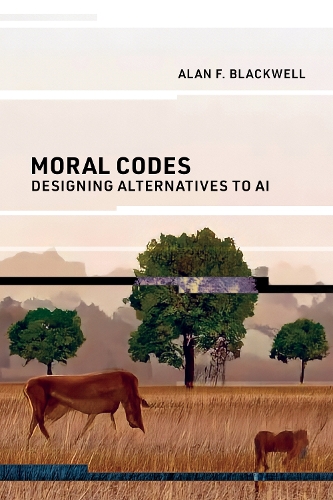
Moral Codes: Designing Alternatives to AI
(Paperback)
Publishing Details
Moral Codes: Designing Alternatives to AI
By (Author) Alan F. Blackwell
MIT Press Ltd
MIT Press
10th September 2024
United States
Classifications
General
Non Fiction
006.3
Physical Properties
Paperback
240
Width 152mm, Height 229mm
Description
Decades ago, we believed that robots and computers would take over all the boring jobs and drudgery, leaving humans to a life of leisure. This hasn't happened. Instead, humans are still doing boring jobs, and even worse, AI researchers have built technology that is creative, self-aware, and emotional-doing the tasks humans were supposed to enjoy. How did we get here In Moral Codes, Alan Blackwell argues that there is a fundamental flaw in the research agenda of AI. What humanity needs, Blackwell argues, is better ways to tell computers what we want them to do, with new and better programming languages- More Open Representations, Access to Learning, and Control Over Digital Expression, in other words, MORAL CODE. Blackwell draws on his deep experiences as a programming language designer-which he has been doing since 1983-to unpack fundamental principles of interaction design and explain their technical relationship to ideas of creativity and fairness. Taking aim at software that constrains our conversations with strict word counts or infantilizes human interaction with likes and emojis, Blackwell shows how to design software that is better-not more efficient or more profitable, but better for society and better for all people. Covering recent research and the latest smart tools, Blackwell offers rich design principles for a better kind of software-and a better kind of world. Why the world needs less AI and better programming languages. Decades ago, we believed that robots and computers would take over all the boring jobs and drudgery, leaving humans to a life of leisure. This hasn't happened. Instead, humans are still doing boring jobs, and even worse, AI researchers have built technology that is creative, self-aware, and emotional-doing the tasks humans were supposed to enjoy. How did we get here In Moral Codes, Alan Blackwell argues that there is a fundamental flaw in the research agenda of AI. What humanity needs, Blackwell argues, is better ways to tell computers what we want them to do, with new and better programming languages- More Open Representations, Access to Learning, and Control Over Digital Expression, in other words, MORAL CODE. Blackwell draws on his deep experiences as a programming language designer-which he has been doing since 1983-to unpack fundamental principles of interaction design and explain their technical relationship to ideas of creativity and fairness. Taking aim at software that constrains our conversations with strict word counts or infantilizes human interaction with likes and emojis, Blackwell shows how to design software that is better-not more efficient or more profitable, but better for society and better for all people. Covering recent research and the latest smart tools, Blackwell offers rich design principles for a better kind of software-and a better kind of world.
Author Bio
Alan F. Blackwell is Professor of Interdisciplinary Design in the Cambridge University department of Computer Science and Technology. He is a Fellow of Darwin College Cambridge, cofounder with David Good of the Crucible Network for research in Interdisciplinary Design, and with David and Lara Allen the Global Challenges strategic research initiative of the University of Cambridge.
